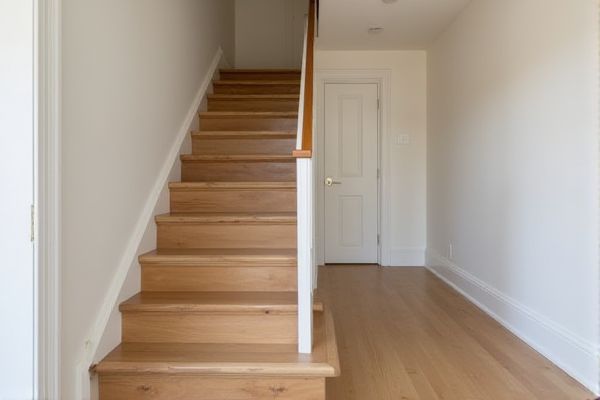
Attic drop stairs save space by folding away when not in use, making them ideal for smaller areas, whereas fixed stairs provide constant, stable access with increased safety and convenience. Discover which option best suits your home's needs and how to make the right choice in the rest of the article.
Table of Comparison
| Feature | Attic Drop Stairs | Fixed Stairs |
|---|---|---|
| Installation | Retractable, installed in ceiling opening | Permanently installed, fixed to floor and attic |
| Space Usage | Compact, folds up to save space | Requires dedicated stairwell space |
| Cost | Lower initial cost | Higher installation and material cost |
| Accessibility | Less convenient, requires unfolding | Always accessible, safer for frequent use |
| Safety | Moderate, risk during folding/unfolding | High, stable and secure stair design |
| Durability | Less durable due to moving parts | More durable with solid construction |
| Use Frequency | Ideal for occasional attic access | Suitable for frequent daily use |
Introduction to Attic Access Solutions
Attic drop stairs provide a space-saving and cost-effective solution for occasional attic access, folding neatly against the ceiling when not in use. Fixed attic stairs offer more stability and ease of use, ideal for frequent access and carrying heavier loads. Your choice between drop and fixed stairs depends on available space, budget, and how often you need to access your attic.
Overview of Attic Drop Stairs
Attic drop stairs offer a space-saving, retractable solution ideal for infrequent access, featuring hinged or telescoping designs that fold neatly into the ceiling. Fixed attic stairs provide a permanent, sturdy structure with easier and safer access, typically constructed from wood or metal and integrated into the home's framework. Choosing between attic drop stairs and fixed stairs depends on frequency of use, available space, and safety preferences.
Overview of Fixed Attic Stairs
Fixed attic stairs provide a permanent, sturdy solution for accessing attic spaces, typically constructed from wood or metal for enhanced durability. These stairs offer improved safety and ease of use compared to retractable options, supporting frequent access and heavier loads. When planning your attic access, fixed stairs maximize convenience and long-term reliability in your home.
Installation Requirements and Costs
Attic drop stairs require minimal installation time and lower upfront costs due to their compact, foldable design that fits into existing ceiling spaces without major structural changes. Fixed stairs demand more extensive construction, including framing and potentially modifying floor joists, leading to higher labor expenses and material costs. Choosing between drop and fixed attic stairs hinges on budget constraints, space availability, and the desired durability of the staircase.
Space Efficiency Comparison
Attic drop stairs offer superior space efficiency by folding compactly into the ceiling, freeing up floor area in your room when not in use. Fixed stairs require a permanent footprint, occupying consistent floor and wall space which can limit furniture arrangement and room design. Choosing drop stairs maximizes available living space, ideal for smaller homes or rooms with limited square footage.
Safety and Accessibility Considerations
Attic drop stairs offer space-saving benefits but require careful handling due to potential safety risks, such as instability or limited handrails, which can challenge accessibility for elderly or disabled individuals. Fixed stairs provide a safer and more stable option with consistent handrails and wider steps, enhancing accessibility and minimizing fall hazards. Choosing between these options depends on your acceptable balance between space efficiency and the need for secure, easy attic access.
Durability and Maintenance Needs
Fixed attic stairs typically offer greater durability due to their solid construction and robust materials such as hardwood or metal, resulting in longer lifespan under frequent use. Attic drop stairs, often made from lighter materials like aluminum or composite wood, require more frequent maintenance to ensure hinges and locking mechanisms remain functional and safe. Regular inspections and lubrication are essential for drop stairs to prevent wear and ensure smooth operation, whereas fixed stairs generally need minimal upkeep.
Aesthetic Impact on Home Interior
Attic drop stairs offer a minimal aesthetic impact by remaining hidden when not in use, preserving your home's clean ceiling lines and maximizing interior space. Fixed stairs contribute a permanent architectural element that can be designed to complement your home's style, often becoming a focal point in the room. Choosing between these stair types depends on balancing your desire for seamless design with the need for constant accessibility to the attic.
Energy Efficiency and Insulation
Attic drop stairs typically offer less insulation compared to fixed stairs, leading to potential heat loss and decreased energy efficiency in your home. Fixed stairs can be integrated with continuous insulation and airtight sealing, reducing drafts and maintaining consistent indoor temperatures. Choosing well-insulated fixed stairs enhances your home's overall energy performance and helps lower heating and cooling costs.
Choosing the Best Option for Your Needs
Attic drop stairs offer a space-saving solution ideal for occasional use and limited ceiling heights, featuring foldable designs that retract into the attic floor. Fixed stairs provide permanent, sturdy access with higher weight capacity and ease of movement, making them suitable for frequent use and carrying heavy items. Evaluating factors like available space, frequency of access, safety, and budget is crucial in choosing between attic drop stairs and fixed stairs.
 homyna.com
homyna.com